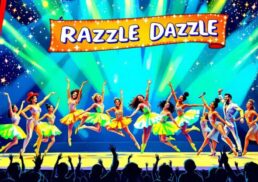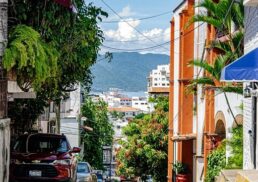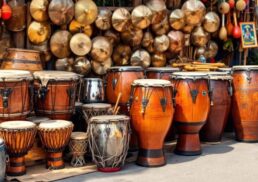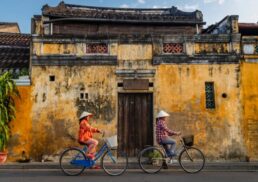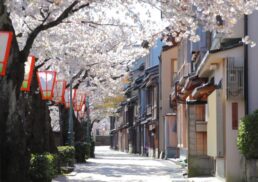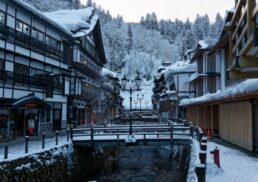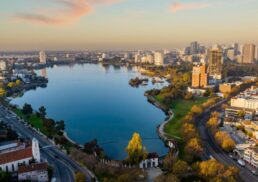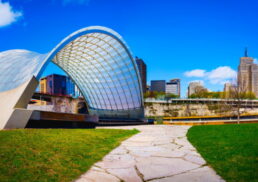Interested in the best that Manchester has to offer? This city in Manchester is known for its rich history, vibrant cultural life, and significant economic presence. In this article, discover key attractions, historical insights, and cultural highlights that make Manchester a dynamic city to visit or live in.
Table of Contents
Key Takeaways
Manchester has a rich historical background, transforming from a Roman fort into a global textile hub during the Industrial Revolution and undergoing significant post-war regeneration.
The city features a diverse and vibrant cultural scene, celebrated through annual festivals and a notable music heritage, reflecting its dynamic community and artistic expressions.
Manchester’s economy is rapidly growing, driven by diverse industries including technology and healthcare, supported by strong educational institutions and research initiatives.
Historical Background of Manchester
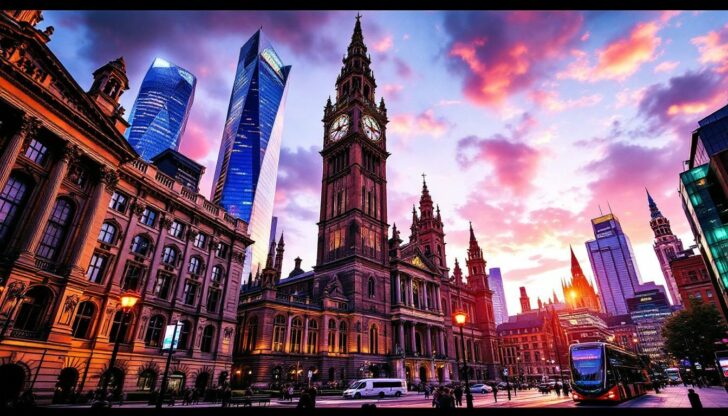
Manchester’s rich history is a tale of transformation and resilience. The city’s journey began with Mamucium, a Roman fort built around AD 79, which laid the foundation for its urban development. Over the centuries, Manchester evolved from this modest fort into a major urban center, particularly during the Industrial Revolution when it earned the nickname ‘Cottonopolis’ due to its dominance in textile manufacturing.
The post-war period saw significant regeneration efforts to revitalize the city, addressing urban decay and fostering economic revival.
Early Beginnings
Manchester’s roots trace back to Roman history, with the establishment of the fort Mamucium around AD 79 marking the city’s origins. Located strategically near key military roads, Mamucium was garrisoned by auxiliary troops, serving as a crucial point of defense and control.
This initiative paved the way for Manchester’s challenge future growth.
Industrial Revolution Impact
The Industrial Revolution was a turning point for Manchester, transforming it into a global center for textile manufacturing. During the 19th century, the city became known as ‘Cottonopolis’ due to its booming cotton industry.
The rail system, developed in 1830, further cemented Manchester’s role in the UK’s industrial network, enhancing its connectivity and economic influence.
Post-War Regeneration
After World War II, Manchester faced urban challenges like population decline and derelict spaces. Extensive regeneration efforts aimed at economic revival and addressing urban decay revitalized the city.
These initiatives transformed Manchester into a thriving urban center, leading to its modern development.
Governance and Administration
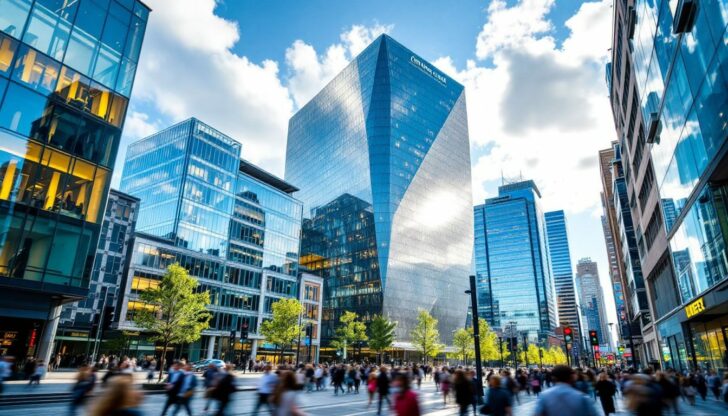
Manchester’s governance includes a multi-layered structure of local councils and regional authorities. This collaborative approach ensures that various aspects of city life, such as transportation, housing, and economic development, are effectively managed.
The city enjoys significant autonomy over its economic governance, managing substantial budgets to enhance local power development.
Manchester City Council
The Manchester City Council plays a pivotal role in governance, representing residents’ interests and managing local services. The mayor and councillors are elected to make decisions on behalf of their constituents, covering a wide range of areas, including health, education, and urban development.
The council ensures the community’s needs are met effectively.
Greater Manchester Combined Authority
The Greater Manchester Combined Authority (GMCA) enhances collaboration among local authorities in Greater Manchester. This body oversees transport, housing, and economic development, driving initiatives that impact the entire region.
Comprising representatives from the ten Metropolitan Boroughs, the GMCA ensures diverse representation and coordinated regional growth.
Geography and Climate
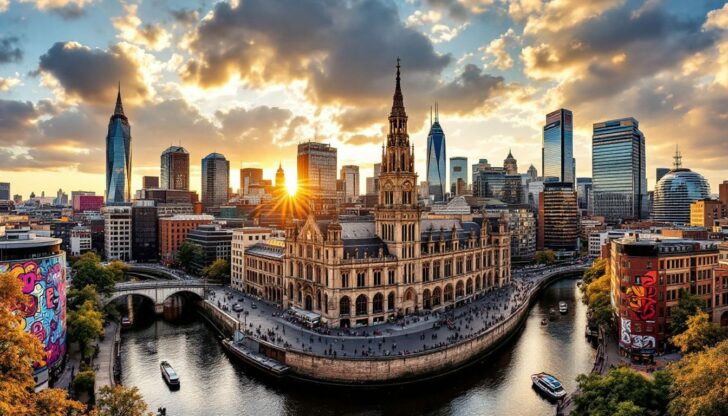
Manchester’s geography and climate are integral to its character. The city lies in a basin surrounded by the Pennines to the north and east, and the Cheshire Plain to the south. This varied topography, with an average elevation of 150 feet above sea level, influences its urban sprawl and development.
The temperate oceanic climate, with mild summers and cold winters, shapes the city’s daily life and activities.
Geographic Layout
Manchester’s geographic layout is defined by its elongated shape along the River Irwell, with urban sprawl toward the south and west. The Pennines, an upland range to the east, and the Cheshire Plain to the south, contribute to the city’s low-lying topography and varied landscape.
These features have historically influenced Manchester’s development and expansion.
Climate Characteristics
Manchester has a temperate oceanic climate, with mild summers and cold winters. The warmest month is July, with average daily temperatures exceeding 68°F, while January is the coldest, with highs around 46°F and lows around 37°F.
The city experiences its wettest conditions in December, with over 12 days of rainfall each month, influencing various outdoor activities and events.
Demographics and Diversity
Manchester is a melting pot of cultures and demographics. As of 2021, the city’s population stands at approximately 551,938, reflecting a growth of 9.7% since 2011. This diverse population enriches the cultural landscape, featuring a blend of music, arts, and community events.
The city’s demographic trends and cultural diversity make it a vibrant and dynamic place to live and visit.
Population Trends
Historically, Manchester’s population peaked at 766,311 in 1931 before declining due to post-war housing policies. Recent trends show significant growth, particularly between 2001 and 2011, indicating ongoing urban expansion.
The city’s ethnic variety is notable, with significant contributions from South Asian, African, and Eastern European communities. As of 2021, Asian British individuals make up 20.9% of the population, with a significant number being of Pakistani descent.
Cultural Diversity
Cultural diversity is a hallmark of Manchester. In the 2021 census, the foreign-born population reached 31.4%, up from 11.2% in 1981. This rise in diversity is reflected in the city’s vibrant cultural scene and community activities.
The Asian British population, particularly those of Pakistani descent, has increased to 20.9% in 2021, adding to the city’s rich cultural tapestry.
Economy and Industry
Manchester’s economy has undergone significant transformation over the centuries. From its roots as a market town, it became a powerhouse during the Industrial Revolution, known as ‘Cottonopolis’ for its textile manufacturing dominance.
Post-World War II, the city faced economic challenges but initiated redevelopment projects that revitalized its economy and infrastructure. Today, Manchester is one of the UK’s fastest-growing cities, with a vibrant job market and diverse industries.
Key Industries
Manchester’s economy is driven by a diverse array of industries. Historically, the city was known as ‘Cottonopolis’ due to its booming cotton industry during the Industrial Revolution. Today, it excels in advanced fields such as artificial intelligence, data analytics, and healthcare technology. Major global brands like Google and Amazon have established operations in Manchester, underlining the city’s attractive business environment.
MediaCityUK is a vibrant hub for media and digital enterprises, significantly contributing to Manchester’s economy.
Economic Growth
Manchester’s economic growth has been impressive, with job growth rates significantly outpacing the national average. Between 2002 and 2015, the city experienced an 84% increase in job growth.
Universities in Manchester play a pivotal role in this growth, driving innovation and technological advancements through various research initiatives. The diverse population of over 2.8 million provides a strong talent pool, fostering collaboration across different industries.
Iconic Landmarks and Attractions
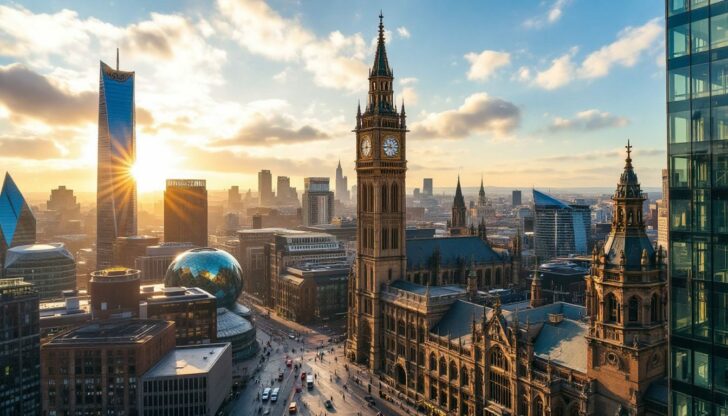
Manchester boasts a diverse range of attractions that appeal to both history enthusiasts and modern art lovers. The city has successfully transformed its industrial sites into cultural hubs, blending history with modern artistic expressions.
From historic landmarks to contemporary developments, Manchester offers a wealth of possibilities for exploration and search enjoyment.
Historic Sites
Manchester is home to several historic landmarks that reflect its rich heritage. The Manchester Cathedral is a significant site, known for its stunning architecture and historical significance.
The John Rylands Library, an iconic Victorian Gothic building, houses a remarkable collection of rare books and manuscripts and offers free admission to the public.
Modern Developments
Modern developments in Manchester showcase the city’s dynamic and evolving character. MediaCityUK is a contemporary hub hosting major media organizations and creative businesses. The Northern Quarter, known for its trendy shops, bars, and artistic vibe, appeals to a younger crowd and adds to the city’s vibrant cultural scene.
Transportation Infrastructure
Manchester’s transportation infrastructure is extensive and well-integrated, facilitating movement within the city and beyond. The rail network, Metrolink tram system, and Manchester Airport are key components that enhance connectivity and support the city’s growth.
Rail Networks
Manchester’s rail network is a cornerstone of its transportation infrastructure. It includes several historic stations that have undergone significant upgrades to improve service efficiency and connectivity.
These enhancements have made the rail system more efficient, facilitating easier travel within the city and to other regions.
Metrolink Tram System
The Metrolink tram system is a vital component of Manchester’s public transport network. It offers extensive routes that connect key areas of the city and its suburbs.
Plans to expand the tram network aim to further enhance urban mobility and make it easier for residents and visitors to navigate the city.
Manchester Airport
Manchester Airport serves as a major international gateway, connecting the city to numerous global destinations. It is one of the busiest airports in the UK, hosting 49 airlines and connecting to 196 destinations worldwide. This makes it a critical hub for both business and leisure travel, bolstering the city’s economic landscape.
Cultural Scene
Manchester’s cultural scene is vibrant and diverse, encompassing a wide range of artistic expressions and events. The city hosts numerous festivals, such as the Manchester International Festival and Manchester Pride Festival, which celebrate creativity and inclusivity.
Food and drink festivals further highlight Manchester’s culinary diversity, enriching the cultural landscape.
Music Heritage
Manchester’s music heritage is legendary, with venues like Band on the Wall and the O2 Ritz hosting influential acts since the 1970s. Historic venues like New Century Hall and the O2 Apollo have seen performances by iconic artists such as Jimi Hendrix and The Rolling Stones.
The city’s music legacy continues to thrive, making it a significant destination for live performances.
Performing Arts
The performing arts scene in Manchester is rich and varied, with venues like the Royal Exchange Theatre known for its unique in-the-round stage format. The city hosts a variety of performances, from local productions to major international tours, showcasing its commitment to the arts.
These events highlight the city’s vibrant cultural life and attract audiences from near and far.
Museums and Galleries
Manchester’s museums and galleries offer a dynamic viewing experience with rotating exhibitions that highlight both local and international artists. These institutions attract visitors and promote engagement with the arts, significantly contributing to the city’s cultural landscape.
They foster a rich artistic community and play a key role in Manchester’s cultural identity.
Education and Innovation
Education and innovation are integral to Manchester’s identity. The city’s dynamic population includes a significant number of students and young professionals, reflecting its vibrant educational environment.
Manchester’s universities and colleges contribute to its vibrant community and drive innovation, making the city a hub for research and technological advancements.
Universities
Manchester is home to several prestigious universities, including the University of Manchester, known for its strong emphasis on research and global impact. The Whitworth, part of the University of Manchester, features impressive collections and serves as a significant cultural space.
The presence of numerous colleges and universities fosters a vibrant atmosphere and significantly contributes to the city’s educational and cultural environment.
Research and Development
Research and development are at the heart of Manchester’s innovation ecosystem. The University of Manchester plays a pivotal role in projects like Sister, fostering connections between academic research and business innovation. The city’s universities drive technological advancements and collaborate with industries to address real-world challenges.
This synergy between academia and industry positions Manchester as a leader in research and development.
Sports and Recreation
Manchester’s sports culture is vibrant and deeply ingrained in the city’s identity. The city regularly hosts major sporting events and cultural showcases that attract visitors from around the world.
From football to cycling, Manchester offers a wide range of sports and recreational activities that cater to both residents and visitors.
Football Clubs
Manchester is renowned for its top-tier football clubs, Manchester United and Manchester City. Both clubs have rich histories of success and regularly participate in high-profile matches and UEFA competitions.
The Etihad Stadium, home to Manchester City, and Old Trafford, home to Manchester United, are iconic venues that draw football fans from around the globe.
Other Sports Facilities
Beyond football, Manchester offers a variety of sports facilities. The National Cycling Centre is a premier location for cycling events, including the upcoming 2025 Lloyds British National Track Championships. The city also hosts ice hockey with the Manchester Storm, the only professional team in the North West.
These facilities provide ample opportunities for recreational and competitive sports resources, enhancing the city’s vibrant sports culture.
Living in Manchester
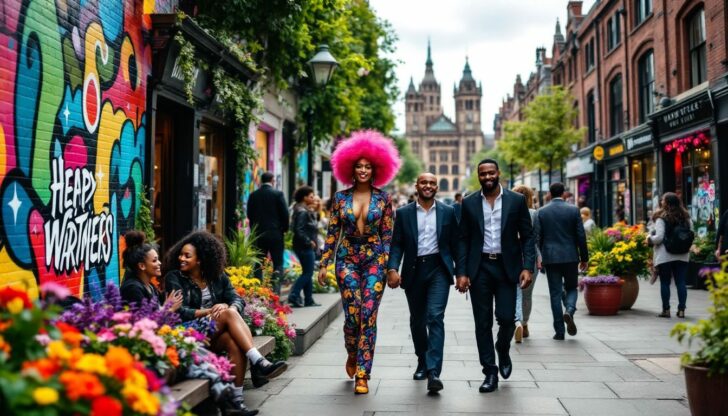
Living in the city of manchester offers a unique blend of urban conveniences and cultural experiences. The city is home to a vibrant sports culture and a wide range of leisure activities, catering to diverse lifestyles.
Manchester provides residents with a rich and varied quality of life, from organized sports activities to cultural events.
Housing and Cost of Living
Manchester’s housing market is diverse, offering options that cater to different income levels. The cost of living in Manchester is generally lower than in many other major UK cities, making it an attractive place for new residents. Rent for a one-bedroom apartment in the city center averages around £1,725 per month, while university accommodation starts from approximately £117 per week.
The city is ranked among the top 10 most budget-friendly locations for students in the United Kingdom.
Community and Lifestyle
Manchester’s community is vibrant and diverse, reflecting its rich cultural scene and numerous social activities. The city boasts a diverse range of events, nightlife, and entertainment options, catering to various interests. Outdoor activities are abundant, with residents enjoying parks, trails, and nearby natural attractions.
This diverse community and vibrant lifestyle make Manchester an attractive place to live.
Upcoming Events
Manchester’s event calendar is packed with exciting activities, from cultural festivals to special events. The city hosts various music festivals and events, highlighting its vibrant scene. Upcoming events include the Polar Express™ Train Ride on December 10, 2024, and other festive activities that draw visitors from near and far.
Annual Festivals
Manchester is known for its annual festivals that celebrate the city’s diversity and creativity. The Manchester Day Parade and Parklife Festival are major events that attract large crowds and showcase local and international talent.
Family-friendly events like Halloween and Christmas celebrations engage all age groups and enrich the city’s cultural calendar.
Special Events
Special events in Manchester add to its vibrant cultural scene. Candlelight Christmas concerts, featuring soundtracks from films like ‘Love Actually,’ are scheduled for December 15, 2024, which is an important date. Other notable events include Jurassic World: The Exhibition on December 10, 2024, and the Land of Lights Lantern Festival running from November 9, 2024, to January 4, 2025.
These events highlight Manchester’s dynamic and festive atmosphere.
Learn more, 16 of the very best attractions and things to do in Manchester.
Summary
Manchester is a city that seamlessly blends its rich historical heritage with modern vibrancy. From its Roman origins to its role as a global industrial center, and from its diverse population to its dynamic cultural scene, Manchester offers something for everyone. The city’s well-developed transportation infrastructure, thriving economy, and vibrant community life make it an attractive place to live, work, and visit. As we look to the future, Manchester continues to evolve, promising new possibilities and exciting developments.
Frequently Asked Questions
What are the key historical landmarks in Manchester?
The key historical landmarks in Manchester are the Manchester Cathedral and the John Rylands Library, which exemplify the city’s architectural heritage. These sites are vital to understanding Manchester’s history and culture.
How does Manchester’s transportation infrastructure support its growth?
Manchester’s transportation infrastructure, comprising a comprehensive rail network, the Metrolink tram system, and Manchester Airport, significantly enhances connectivity, thereby facilitating the city’s growth. This robust system is essential for fostering economic development and attracting businesses.
What makes Manchester’s cultural scene unique?
Manchester’s cultural scene is unique due to its rich diversity and vibrancy, encompassing a wide range of festivals, a storied music heritage, and an array of performing arts, museums, and galleries. This eclectic mix fosters a dynamic atmosphere that sets Manchester apart from other cities.
How affordable is living in Manchester compared to other UK cities?
Living in Manchester is generally more affordable than in many other major UK cities, offering a variety of housing options and budget-friendly accommodations, especially for students. This makes it an attractive choice for those seeking a cost-effective urban lifestyle.
What upcoming events can visitors look forward to in Manchester?
Visitors to Manchester can anticipate engaging events such as the Polar Express™ Train Ride on December 10, 2024, Candlelight Christmas concerts, and the Land of Lights Lantern Festival. These events promise to enhance the festive atmosphere of the city.


